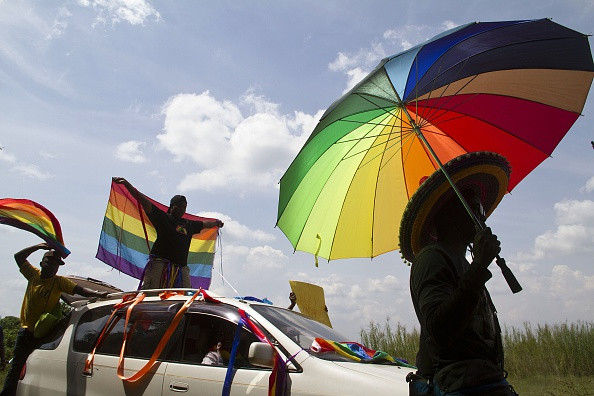Human Rights Day 2014: Gay Ugandans 'need a global response, not sanctions'

The Ugandan government is trying to implement a new anti-gay bill, months after the previous one was annulled by the constitutional court.
As Ugandan parliamentarians ensured the bill will be most certainly passed in December, to give a "Christmas present to people", gay rights activists have been warning that, if turned into law, the proposal would allow the persecution not only of homosexuals, but also of anyone suspected of supporting homosexuality.
Homosexuality is already a crime in Uganda. However the new proposed law criminalises:
Members of the LGBT community who will risk seven years' imprisonment and the exclusion from employment due to the criminalisation of those who 'aid and abet' the promotion of homosexuality.
People who own property in which "unnatural sexual practices" occur.
Activists and advocates in the LGBTI community who will be also banned from publishing, broadcasting and distributing of information "intended to facilitate" homosexuality or providing funding that is viewed as promoting homosexuality.
According to 2014 Nobel Peace Prize nominee Frank Mugisha, who is executive director of Uganda's umbrella organisation Sexual Minorities Uganda (SMUG), politicians from western countries should engage in constructive talks with Ugandan leaders to prevent a crackdown on homosexuals.
"The international community should engage with our politicians," he told IBTimes UK. "When my colleague and friend David Kato was killed in 2012 for his advocacy work, many politicians worldwide condemned the murder. This means that leaders want to help defeat homophobia in certain countries."
However, Mugisha believes that applying sanctions to help tackle homophobia in Uganda, as the US threatened to do, is not the right approach to defeat the problem.
"The international community should engage diplomatically and respond in positive ways; if they really want to put sanctions, they should only expose and target politicians and religious leaders who promote homophobia. They cannot target a whole country."
Uganda's anti-gay bill
The anti-gay bill was first put forward in 2009 by MP David Bahati. It originally proposed a death sentence for homosexuals.
The proposed legislation, which was later amended and condemned gay Ugandans to life imprisonment, was dropped two years later, after the murder of David Kato sparked international outcry.
It was only in August 2014 that Uganda's President Yoweri Museveni signed the bill into law prompting many countries to condemn its decision to criminalise homosexuality.
Shortly after, however, the law was annulled by the country's constitutional court on the grounds that the parliament had passed it without the required quorum.
Religious propaganda and misinformation
Mugisha explained that the main cause of the widespread homophobia in Uganda is religious propaganda and misinformation.
"The church in Uganda is very homophobic and we need other churches to come and engage in constructive talks and teach our religious leaders to preach the good gospel," he said.
"Misinformation is another problem; many Ugandans fear homosexuals because they think we want to recruit children and make them become homosexuals. Thus, Ugandans want to protect their culture, and this protective behaviour has been enhanced by the media, which been very active in promoting homophobia.
"Furthermore, many leaders keep claiming that homophobia is not part of the African history. But African presidents are out of touch with reality, because there is homosexuality in our history and leaders claim that gays are 'un-African' only to gain popularity and votes."
Thousands of gays will be 'homeless and jobless'
Mugisha also warned that the proposed legislation would also punish anyone suspected of promoting homosexuality, including landlords in whose properties "unnatural sexual practices" occur.
"If the bill is signed to law, many landlords will fear prosecution and will refuse to give a house to anyone suspected of being homosexual, with a result that gay people will not be able to rent and will end up being homeless," said Mugisha.
"Gay Ugandans will also have difficulties in finding a job as the bill criminalises people suspected of 'aiding and abetting' the promotion of homosexuality," he said.
"Therefore, employers will likely refuse to hire LGBT people who express their identity openly, in order to avoid prosecution."
Not only a Ugandan problem
Mugisha said that the problem of homophobic laws does not just affect Uganda. In fact, homosexuality is illegal in at least 20 African countries.
The latest on the list is Nigeria, which last year introduced the Same Sex Marriage (Prohibition) Bill, imposing prison sentences of up to 14 years on those found guilty of involvement in gay organisations. Gays who publicly demonstrate their sexuality can be jailed for 10 years.
According to Human Rights Watch, Cameroon brings more cases against suspected gays than any other African country.
"This is not just a Ugandan problem," Mugisha concluded. "Homosexual laws have been recently passed in Gambia and Nigeria while Kenya is proposing an anti-gay law.
"We need a global response for a global problem."
© Copyright IBTimes 2025. All rights reserved.




















